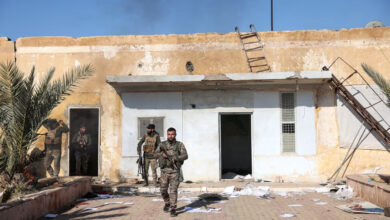How durable, and how deep, is the Arab League consensus regarding Syria? And what will happen if it begins to crack?
In recent months, the Arab League has unexpectedly become a serious player in efforts to manage the Syrian uprising. Breaking with its well-deserved reputation for irrelevance, the league proactively inserted itself into the Syrian crisis in November of last year. Following months of regime violence against Syrian civilians, it suspended Syria’s membership. It then imposed economic sanctions on Syria, and pressured President Bashar al-Assad’s regime into accepting an observer mission intended to reduce the regime’s violence against protesters. The league’s decisions were not unanimous — Iraq, Algeria, and Lebanon voted against the suspension of membership and sanctions — yet pressure from Saudi Arabia and Qatar, together with support from other Gulf Cooperation Council states and post-authoritarian governments in Tunisia and Libya, made possible a striking degree of inter-Arab consensus on a robust package of measures targeting the Assad regime.
The emergence of this consensus was broadly welcomed in Western capitals, and in Turkey. Both had to carefully balance their opposition to the Assad regime against their reluctance to be seen as getting too far out in front in efforts to secure its removal. Both are keenly aware of the Syrian opposition’s sensitivity to foreign intervention. Neither wanted to give credibility to the Assad regime’s claims that protests and anti-regime attacks were the work of a Western conspiracy. Thus, for both Turkey and the West, the Arab League’s activism on Syria brought significant advantages. It provided convenient cover for Western governments and Turkey, gave a useful veneer of Arab legitimacy to the escalation of Western diplomatic and economic sanctions, and served as an additional rationale for Western efforts to lobby for UN Security Council sanctions as an additional instrument of pressure on the regime.
In the week ahead, however, the Arab League’s consensus on Syria will face its most serious challenges to date. This Sunday, the Arab League will meet in Cairo to assess future action on Syria. The league’s observer mission will formally conclude its work on 19 January, and is expected to present its final report to the league almost immediately. It will not make for happy reading. Not surprisingly, the presence of a small, poorly trained, poorly equipped, and easily outmaneuvered delegation of Arab monitors — with a one-month mandate, to boot — did nothing to blunt the regime's relentless violence against Syrian civilians. Since the observers arrived in Syria less than a month ago, the civilian death toll has climbed by several hundred. President Assad publicly mocked the Arab League in a speech on 10 January, in which he again blamed the uprising on foreign conspiracies, and promised to deploy an iron hand against his opponents.
In anticipation of a negative review from its observer mission, the Arab League has already begun discussions about how to respond. The resulting debate has already exposed fault lines within the league, including between Secretary General Nabil al-Araby and a number of Gulf states, and these may well deepen should debate drag on. Among the league’s possible next steps are a decision to extend or expand the current observer mission; a vote to refer Syria to the UN Security Council with a recommendation in support of sanctions — a move that will add to pressure on Russia and China, which have, until now, protected the Assad regime from serious UNSC sanctions; and, the most dramatic but also most far-fetched moves, a proposal by Qatari Emir Sheikh Hamad bin Khalifa al-Thani to send Arab League forces to Syria to “stop the killing.”
Given the failure of the Arab League observer mission, and the Assad regime’s contempt for its efforts, it would be very difficult for the league to do nothing. Its least divisive option diplomatically will be to extend the mandate of an enlarged, better trained, and better equipped observer mission. It may well default to this least-costly outcome on Sunday. Anything beyond this, however, including a referral to the Security Council, is likely to provoke heated and potentially inconclusive debate among the league’s member states, testing the limits of its consensus on Syria, and potentially encouraging Syria’s allies to escalate their opposition to any further punitive measures.
While this eventuality may not occur, the erosion of the league’s consensus on Syria will have significant negative consequences. Not only would it deepen the sense of isolation and despair among Syrians. It could well leave Turkey and its Western counterparts without the clear backing of regional states at a moment when regime violence in Syria is increasing, the Assad regime is becoming increasingly bellicose, and the militarization of the Syrian uprising continues to deepen. While it is far too soon to predict that the Arab League’s consensus will collapse, strains in the anti-Assad coalition would threaten the momentum that has developed in the past month concerning the urgency of additional Arab measures to pressure the Assad regime, weaken efforts to secure UN Security Council sanctions, and reinforce perceptions among Syria’s leaders that defiance pays off. Preventing such an outcome is beyond the influence of the US and its Western and Turkish partners. Yet making clear to the Arab League the consequences of diluting its consensus on Syria should be a priority for American diplomats as the league prepares for its deliberations next week.
Steven Heydemann is a senior adviser for Middle East initiatives at the United States Institute of Peace.




